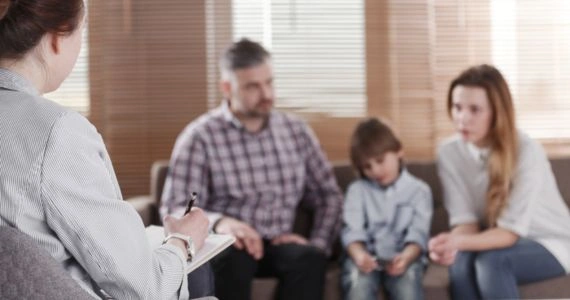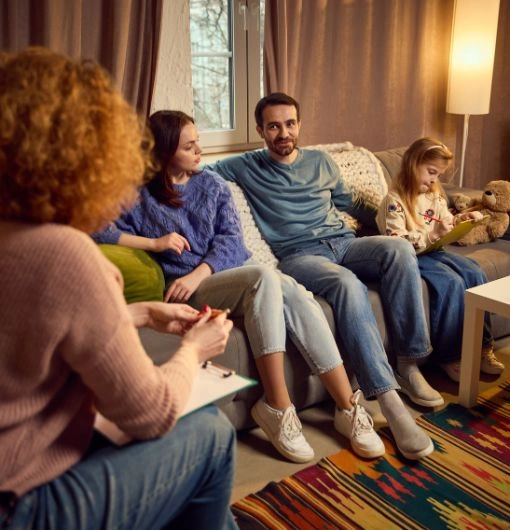Addiction Rehab Family Program Participation
The Benefits of Family Support: From Treatment to Long Term Recovery
Table of Contents
Let’s start by talking about ‘Marcus.’ When Marcus entered treatment at Changes Healing Center, his teenage daughter was barely speaking to him. A deep wedge had been driven between Marcus and his wife, who found herself constantly on guard from another broken promise.
When he entered treatment, Marcus found himself worrying that it was already late and he had already lost them.
Marcus’s story is one of many that shows the family unit behind people in recovery – the confused children, worried parents, and hurt partners. And when the family unit recovers together, real change can happen.
With addiction rehab family program participation at Changes, walls are broken down. Communication gets better, old wounds start to heal, and those in recovery learn they don’t have to face this battle alone.
Why Family Matters in Addiction Recovery
Returning to Marcus’s story, after two weeks in treatment, his wife agreed to sit across from him during counseling. She finally heard him speak without the mask of alcohol for the first time in years. His daughter joined several sessions later. Through tough conversations and even some tears, they started to heal together.
How Loved Ones Are Affected by Substance Abuse
You might not notice, but your partner might walk on eggshells around you, trying to avoid an emotional outburst when you’re intoxicated. They might shoulder extra responsibilities or try to keep kids from noticing what is going on. Despite your partner’s best efforts, children often feel this chaos and distance from one of their parents.
Parents and partners find themselves worrying. They worry about you drinking so much that you drain your finances, end up in legal trouble, or crash your car. They might be worried about drug addiction and overdose.
The Role of Enabling and Codependency
What would you do for someone you love? Family members might try to excuse behaviors or stop their loved one from facing the consequences of substance abuse. Unfortunately, this is one of the worst ways to provide support. It’s called enabling, and codependency soon follows.
When you enable your loved one, you prioritize them seeing you in a positive way over making the best decision. You might give them money for drugs or alcohol, to stop them from stealing, or get up at all hours of the night if they need a ride.
With enabling, codependency soon follows. You spend too much time wondering how your loved one feels about you. It makes you afraid to speak up, because you’re worried that you’ll push them away. But when keeping the peace gets in the way of encouraging them to seek help, it becomes a toxic, dangerous situation.
Part of our addiction rehab family program is learning to navigate addiction with appropriate boundaries that support recovery, rather than enabling addiction. This includes having rules and standards so that you are helping them recover, not helping them use.
Helping Your Loved One Take the First Step
It can be scary to approach someone about drinking patterns you’ve noticed. You might not know what to say or how they will react. Your loved one might even push back or feel attacked, putting some distance between you and them.
Even when this happens, know that addressing addiction before it spirals out of control is always the right choice.
At Changes, we understand how difficult early conversations about a loved one’s addiction can be. We can help you navigate this conversation about seeking treatment. Call us for tips or to learn more about the steps we take to help families heal in recovery.
What are the Benefits of Involving Family Members in Recovery?
There’s a reason that we try to involve friends and family members in the recovery process whenever possible; it helps. When addiction is taken on together, it isn’t a big, scary dragon that a person struggling with addiction has to face alone.
Better Long-Term Outcomes
According to research, when family members and friends are involved, there’s more hope for good long-term treatment outcomes. Positive relationships can be a motivator for those in recovery.
Your loved one is more likely to stay in treatment and stay sober. They’ll feel comfortable approaching you when they need additional support in looking for healthy ways to cope.
Improved Support System for Alcohol and Drug Addicts
It’s not enough to be there for loved ones in recovery. You need to say the right things, have boundaries, and offer support without enabling. In our family recovery programs at Changes Healing Center, we’ll guide you through each step of this process.
You’ll start to develop an understanding of addiction and the battle your loved one is up against. Likewise, they’ll understand how their relationship with alcohol or drugs has impacted you. When both parties feel understood, it feels like you are teaming up against drugs and alcohol.
What Our Addiction Rehab Family Program Looks Like

Many family members wonder what exactly a family rehab program might look like. You won’t attend rehab with your loved one, but you will be invited along for parts of the recovery process. We try to blend counseling with education and open dialogue in family therapy.
One of our counselors works with the whole family to make this a safe environment, encouraging honesty that starts to rebuild trust.
Dealing with Difficult Feelings About Addiction After Recovery
In recovery, family therapy can raise ugly feelings. A child might feel abandoned, disconnected, or angry at a parent who chose drugs or alcohol over them. Spouses might struggle to feel a connection with their partner or have resentment from taking on so many responsibilities in light of their choices.
Someone else’s drinking can take a serious toll on your life. While ugly, these feelings are honest and must be discussed. When things are swept under the rug, it’s hard to repair the damage that has been done. You cannot start to build healthy family relationships without addressing the cracks in the foundation.
Finding an Al-Anon Meeting for More Support
Al-Anon meetings are for friends and family members who have a loved one struggling with addiction. They provide a safe space where you can process your own experiences, without worrying that what you have to say will upset someone.
As you get guidance from a community of people who understand addiction and the ripple effects on the family unit, it becomes easier to find hope in the situation. Al-Anon meetings provide resources for families struggling with addiction.
Learn More About How the Whole Family Can Heal at Changes

Marcus came to Changes Healing Center afraid it was too late. Through counseling sessions filled with raw honesty and connection, he realized that his family didn’t hate him, they hated the fallout of his addiction.
They also shared similar goals in wanting Marcus to get clean and start being the loving, attentive man that they knew he still was underneath the ways that addiction had changed him.
This is just one example of how even though addiction strains relationships, it doesn’t define them completely. Healing is possible, especially when families show up willing to learn, listen, and rebuild. Involving the family in recovery is something we specialize in at Changes.
Call us today to learn more about how we can help your family heal, together.

